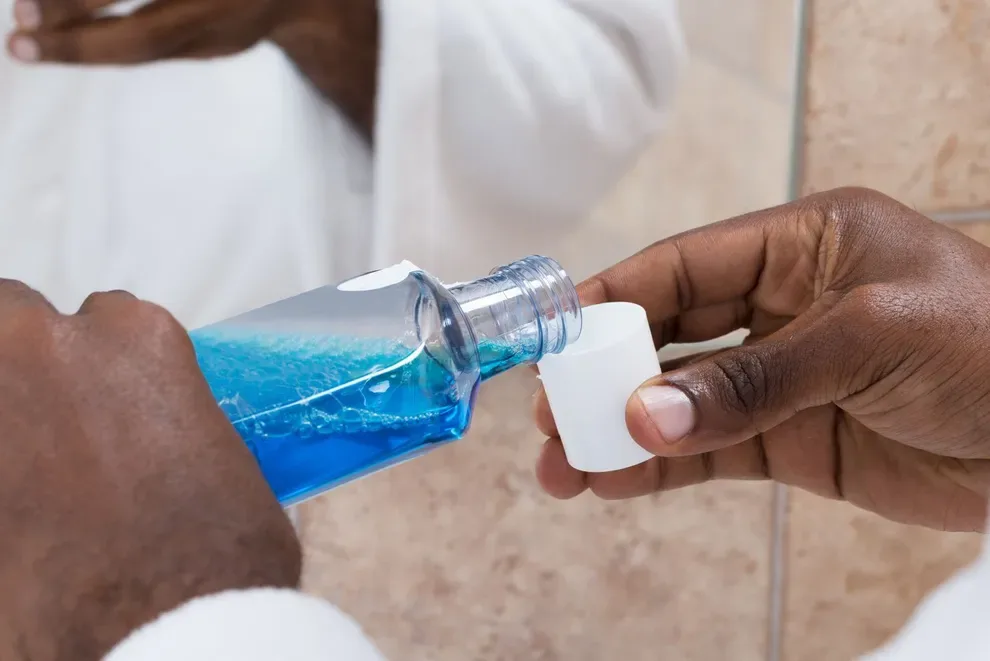Chlorhexidine Gluconate Mouthwash: Gum Disease Treatment

Table of Contents
- Chlorhexidine Gluconate Mouthwash Explained
- How to Use Chlorhexidine Gluconate Mouthwash
- Mouthwash for Gum Disease Treatment
- Safety of Chlorhexidine Gluconate Mouthwash
- References
Chlorhexidine gluconate mouthwash is a topical treatment that can be prescribed by your dentist to treat gingivitis.
Gingivitis is the early stage of gum disease that can often be reversed if managed and treated properly and early enough.
Chlorhexidine gluconate mouthwash effectively kills bacteria that can cause gum disease. Some people may experience difficulties with use and compliance, as it tastes bad and cannot be rinsed away too quickly or it won’t work. There are also some potential side effects especially with long-term use of chlorhexidine gluconate mouthwash.
Chlorhexidine Gluconate Mouthwash Explained
An oral rinse, chlorhexidine gluconate mouthwash is an effective killer of the bacteria in your mouth.
It is a prescription formulation that will usually be prescribed by your dentist to be used for the treatment of gingivitis. It is not designed to treat all forms of gingivitis, and you will need to follow the directions given by your dentist when using it.
Chlorhexidine gluconate mouthwash is an oral solution that contains 0.12% chlorhexidine gluconate. It is designed to be a topical solution that targets bacteria directly on contact.
How to Use Chlorhexidine Gluconate Mouthwash Effectively
To use chlorhexidine gluconate mouthwash, you will swish the required dosage around in your mouth for 30 seconds to a minute and then spit it out. You cannot rinse your mouth right away, or it won’t be effective.
You should also wait at least 30 minutes after brushing your teeth to use the mouthwash, as it can be contradicted by toothpaste. You need to continue using the medication for as long as your dentist prescribes it, even if your symptoms improve before then.
It is possible to overdose on chlorhexidine gluconate mouthwash if you swallow too much of it. Make sure to spit it out, and try not to swallow it. If you feel nauseated or as if you are intoxicated, call your doctor or 911 right away.
Chlorhexidine gluconate can leave an undesirable taste in your mouth and it would be best to avoid rinsing your mouth to remove the taste after using the medication because you can rinse the medicine away and reduce its effectiveness.
Mouthwash for Gum Disease Treatment
The treatment of gum disease will depend on its severity and the state of your oral health. Gingivitis is the early stage of gum disease that is extremely common and recognizable by swollen, red, and bleeding gums. At this stage, gingivitis is often manageable with a professional dental cleaning.
The dentist can also prescribe you chlorhexidine gluconate mouthwash to use in between dental visits to reduce the amount of bacteria in your mouth. Chlorhexidine gluconate is active against a wide array of bacteria, which makes in an effective broad range agent for killing both gram-positive and gram-negative bacteria that can cause gingivitis.
Safety of Chlorhexidine Gluconate Mouthwash
Chlorhexidine gluconate mouthwash can work really well to kill the bacteria causing gingivitis, but it can be very easily inactivated. As a result, it is often difficult to use it properly to ensure its efficacy.
It also leaves a very bitter taste in your mouth that can linger for hours. This is particularly true since you are not supposed to rinse your mouth for at least 30 minutes after swishing with the mouthwash.
Common side effects of chlorhexidine gluconate mouthwash include:
Staining of the teeth.
Increased calculus (plaque) formation, which can be a cause of gingivitis and therefore can counteract itself.
Changes in the way you perceive taste.
Potential for a serious or even life-threatening allergic reaction.
In general, chlorhexidine gluconate mouthwash is considered to be safe for the treatment of gingivitis when directed and prescribed by a dentist. It can have some side effects, however.
It is not likely ideal if you have more advanced gum disease that requires the scaling and root planing procedure. It is possible that the chlorhexidine gluconate mouthwash formulation can actually hinder the reattachment of your gums after this procedure, even as it works to kill the rest of the bacteria in your mouth.
